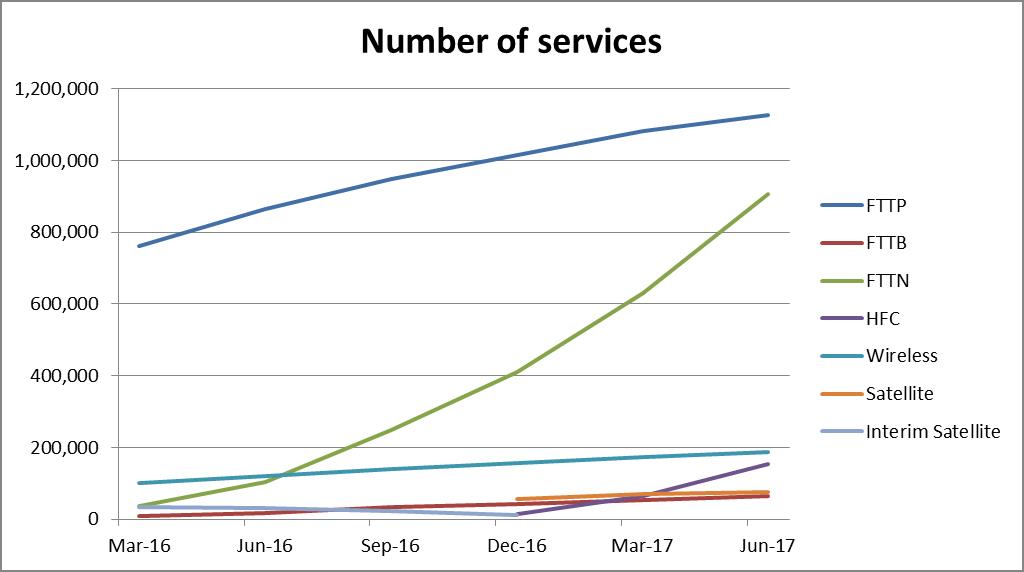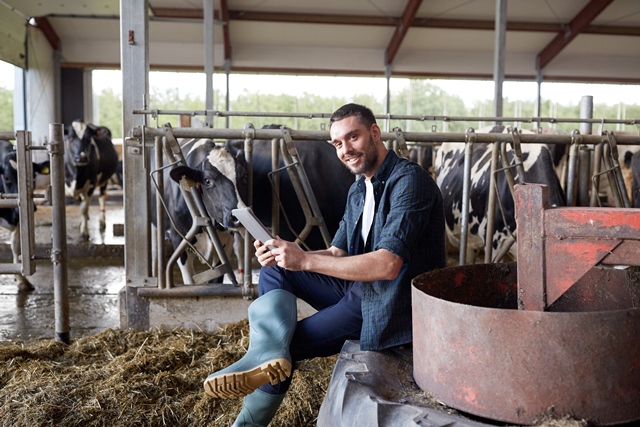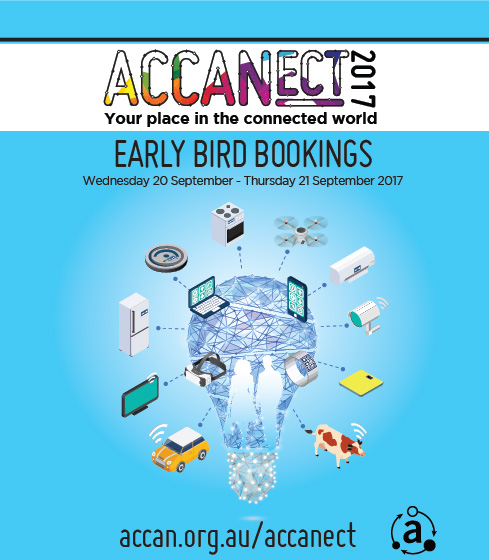Hot Issues
Welcome to the latest current affairs that impact communications consumers.
Sign up for ACCAN's weekly newsletter to have these news items sent to your email address each week.
[ List view | Detailed view ]
- Details
The ACCAN Annual General Meeting was held in Sydney on Thursday, 21 September, 2017. At the meeting the following three candidates were elected to the Board:
- Deirdre O’Donnell
- Victoria Rubensohn
- Holly Raiche
Congratulations to returning director, Victoria, and a warm welcome back to Holly who re-joins the ACCAN Board after a short break. We also extend a warm welcome to Deidre who joins the ACCAN Board for the first time.
These three new Board members join the six continuing Directors below whose terms conclude at the 2018 and 2019 ACCAN AGM:
Read more: Results of ACCAN Board Election
Write comment (0 Comments)- Details
 We’re pleased to announce the successful Grants for 2017-18. This year the projects look at a range of communications consumer issues including the growing spyware marketplace, how consumers can access their online data, the needs of those living in rural, regional and remote communities, and ways telecommunications providers can better engage with people with disability.
We’re pleased to announce the successful Grants for 2017-18. This year the projects look at a range of communications consumer issues including the growing spyware marketplace, how consumers can access their online data, the needs of those living in rural, regional and remote communities, and ways telecommunications providers can better engage with people with disability.
The ACCAN Grants Program funds projects which undertake research on telecommunications issues, represent consumers or create educational tools which empower consumers to derive the greatest benefit from telecommunications products and services.
Read more: Introducing the 2017-18 ACCAN Grants projects
Write comment (1 Comment)- Details
 The Australian Communications Consumer Action network (ACCAN) has a strong membership base of disability organisations and individuals with disability. The most consistent feedback we get from these members relates to the lack of available information about telecommunications equipment and services for people with disability. The difficulty of accessing telecommunications for people with disability in Australia has long been recognised as a fundamental contributor to the disability digital divide.
The Australian Communications Consumer Action network (ACCAN) has a strong membership base of disability organisations and individuals with disability. The most consistent feedback we get from these members relates to the lack of available information about telecommunications equipment and services for people with disability. The difficulty of accessing telecommunications for people with disability in Australia has long been recognised as a fundamental contributor to the disability digital divide.
While there is a growing number of new and emerging telecommunication products which can improve access and participation for people with disability, without information about these products and how to access them, people with disability will continue to be left out of our increasingly connected digital society.
Read more: ACCAN’S Disability Mystery Shopping report 2017
Write comment (0 Comments)- Details
 Have you registered for the ACCANect Conference yet? There’s only two weeks left to get your ticket.
Have you registered for the ACCANect Conference yet? There’s only two weeks left to get your ticket.
It’s being held at the Aerial UTS Function Centre in Sydney on Wednesday 20 September – Thursday 21 September, 2017.
Read more: The ACCANect Conference is fast approaching
Write comment (0 Comments)- Details
Every quarter the ACCC releases a report on the services operating over the NBN wholesale network. The report provides some interesting insights into the NBN, here are some that we find useful.
Number of services
The report shows that over 2.5 million premises are connected to the NBN as at June 2017.
Fibre to the Premises (FTTP) is the primary technology used. The number of services over both Fibre to the Node (FTTN) and Hybrid Fibre-Coaxial (HFC) technologies are increasing at a fast rate. The graph below charts the number of services for each quarter by access technology.

Figure 1: Number of services by access technology1
Write comment (0 Comments)- Details
 Getting remote communities connected can be difficult due to the tyranny of distance. Recently we’ve heard some great stories about retail service providers, infrastructure providers and other organisations that are helping to connect Indigenous consumers in some of the most remote parts of Australia. In this article we’ll look at some of the ways this is being achieved.
Getting remote communities connected can be difficult due to the tyranny of distance. Recently we’ve heard some great stories about retail service providers, infrastructure providers and other organisations that are helping to connect Indigenous consumers in some of the most remote parts of Australia. In this article we’ll look at some of the ways this is being achieved.
Satellite broadband provider, Activ8me, is working with the Australian Government to improve access to telecommunications services in remote Indigenous communities.
Read more: Connecting remote Indigenous communities
Write comment (0 Comments)- Details
ACCAN is seeking nominations for Directors to fill three (3) vacancies on its Board.
In accordance with the ACCAN Constitution, the 2017-2018 ACCAN Board will consist of nine (9) members1. Six (6) positions are continuing Directors from the 2016-2017 Board. Three (3) Directors are retiring from the Board but may be eligible for re-election as stated in the ACCAN Constitution.
In accordance with the ACCAN Constitution Board members are elected for a three year term.
Read more: Call for nominations for the ACCAN Board
Write comment (0 Comments)- Details
In June we were very excited to sign a new funding contract with the Department of Communications and the Arts. The new contract ensures that ACCAN will continue to represent consumers in the telecommunications industry for the next five years.
When the contract was signed, ACCAN CEO, Teresa Corbin said: “The recent ACCAN review highlighted the strong support for the work ACCAN does and many stakeholders reinforced the need for a united consumer voice in the telecommunications industry.
“A big thank you must go to ACCAN’s supporters including members, volunteers and industry representatives for their ongoing commitment to ensuring we remain a relevant and effective organisation.”
Read more: Five years of ACCAN consumer wins
Write comment (0 Comments)- Details
 In the past five years, a total of $1,256,055.86 has been awarded to universities, research organisations, community groups and not for profit organisations to help consumers navigate the telecommunications and technology landscape.
In the past five years, a total of $1,256,055.86 has been awarded to universities, research organisations, community groups and not for profit organisations to help consumers navigate the telecommunications and technology landscape.
The ACCAN Grants Scheme has funded 31 different projects since 2012, examining emerging technologies like 3D printing, through to more serious consumer issues, such as technology facilitated stalking and abuse.
Read more: In the field – ACCAN Grants Scheme 2012-17
Write comment (0 Comments)- Details
 Have you noticed how more and more everyday items are now connected to the internet?
Have you noticed how more and more everyday items are now connected to the internet?
While we used to have ordinary watches that told us the time and the date, we now have smartwatches that track our fitness, alert us about emails and more.
Read more: Explore the connected world at ACCANect 2017
Write comment (0 Comments)- Details
Your place in the connected world
ACCANect 2017
20-21 September, Sydney
Digital technology has transformed consumer experiences around the world. Everything will be connected: devices, houses, transport, food production, health and government services. The “always connected” world raises big questions.
Join us at ACCANect 2017 and help shape the future for connected consumers.
Read more: ACCAN conference announcement
Write comment (2 Comments)- Details
 In April, some members of the Regional, Rural and Remote Communications Coalition had their say on issues relating to the NBN rollout at public hearings in front of the Joint Parliamentary Standing Committee on the National Broadband Network.
In April, some members of the Regional, Rural and Remote Communications Coalition had their say on issues relating to the NBN rollout at public hearings in front of the Joint Parliamentary Standing Committee on the National Broadband Network.
This blog summarises the issues highlighted by AgForce Queensland, Better Internet for Rural, Regional & Remote Australia (BIRRR) and ACCAN at these hearings. Transcripts for the hearings and submissions to the Committee are available online.
Read more: Bush Coalition members outline NBN concerns
Write comment (1 Comment)
